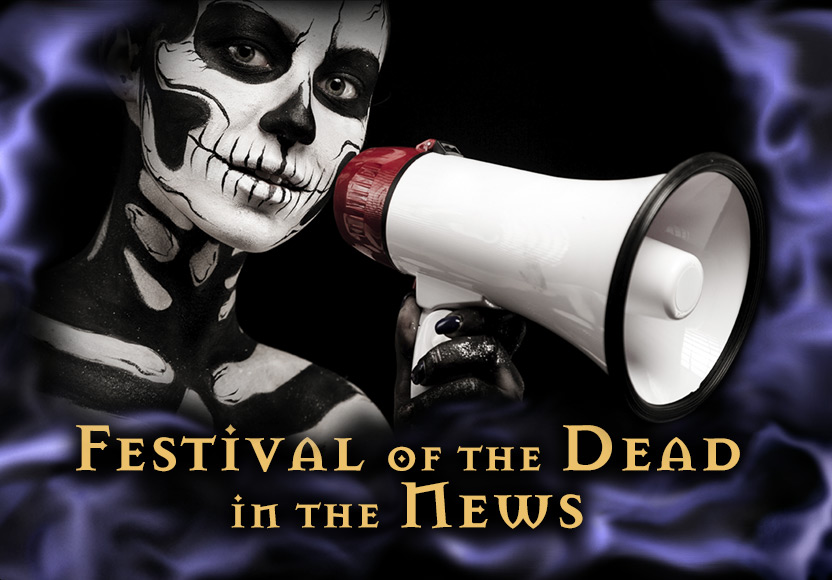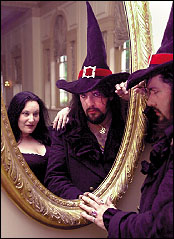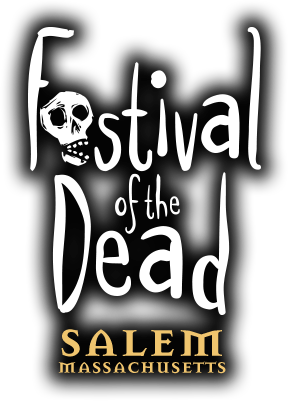
Festival of the Dead host Shawn Poirier is interviewed by the North Shore Sunday for potential inclusion into the Sci Fi Channel's Reality Show, Mad Mad House. He ultimately chose not to participate in the show:
Every witch way but loose
By Joel Beck
North Shore Sunday, Friday, May 23, 2003

A planned TV reality show suggests that Pagan religions haven't yet made the leap to mainstream acceptance. But for some local witches and spiritualists, that's not a bad thing.
Emilie May probably can't speak for the vampires, voodoo priests or psychics of the world, but she knows a thing or two about being a witch. Certainly she knows more, she feels, than anyone on payroll at the Sci-Fi Network.
Living la vida Wicca in the suburbs of St. Paul, Minn., May says she's no stranger to the occasional bouts with ridicule and misconceptions about her beliefs. It isn't uncommon, she says, for people to look at the pentagram dangling from her neck and immediately mistake her for a Satan-worshipping heathen living in a basement full of live goats and dead chickens.
"People tend to still think witches are old ladies casting hexes on people," May says. "They think I'm evil. Then there are the people who are desperate to save my soul. It's ridiculous."
Even today, in a supposed age of acceptance and tolerance, May says people are still shocked and horrified to discover they're standing in front of a witch when all they see is a young, pretty 23-year-old woman.
While the ignoramuses search for the ugly warts, the pointed nose and the flying broomstick, May can only roll her eyes and silently fume.
But it was seeing the phrase "Real live witch wanted" posted on the Sci-Fi cable network's Web site several weeks ago that really got May fuming. Last month, the network began recruiting contestants for the reality TV show "Mad, Mad House," which will feature a witch, a vampire, a yoga master, a voodoo priest and a psychic, all living under the same roof a part of a contest to determine who's the wackiest and weirdest.
For her, the show represents everything that's wrong with the way people view Pagan religions - religions based on spiritual, sometimes "magical" views of nature and the earth, as opposed to a particular deity.
"It irritated me," says May. "It irritated me to the point where I sent out e-mails to all my family and friends.
"As long as the majority of people in this country believe in the same organized basic religion, this is how it's going to be," May adds. "As long as most people believe in the old stories and the fairy tales, it's never going to change."
The ripple caused by May's ire could be felt all the way (not surprisingly) in Salem, where her e-mail campaign eventually made it to the Salem Web message board and has been a topic of discussion for several weeks. In some ways, it's hard to argue with May's logic, especially when people from more mainstream religions begin to chime in with their thoughts on Wicca, witchcraft, and just about every other belief system that doesn't involve sitting in pews on Sunday mornings.
Rev. Kenneth Stiegler of Salem's Wesley Methodist Church says he disagrees with but respects the religious practices of Salem's witch community, but that's not to say his views wouldn't be disturbing to the average witch: Stiegler thinks the desire to take part in such practices may stem more from the popularity of the WB network than actual "religious" beliefs.
"The whole Wiccan milieu is certainly more accepted in general [these days], but not in the church's mind," Stiegler says. "When you have four or five major TV programs that are all about witchcraft and you've got people waiting in long lines for the next Harry Potter book, there's a big hunger to learn the Wiccan religion."
Therein lies the sticking point for people like May, who says its high time people started respecting Wiccans and people with more spirituality-based beliefs as more than just fodder for TV and children's books. But while there appears to be plenty of support in her corner, there are some in the witch community who think she should give it a rest.
For people like Salem witch Shawn Poirier, being a witch has always been about straying from the mainstream to a certain extent and to him, there's no reason to change that now. Take the time last week when Poirer couldn't answer a reporter's phone call because he was busy "mixing a potion" - scenarios like that, just by their nature, are what will always make witches outsiders to the non-potion-mixing crowd.
And that's OK, says Poirier.
"Witches need to lighten up," Poirier says. "If you don't want to be associated with the dark and mysterious world, then don't use the word 'witch.' Witches don't want to be mainstream."
Oh yeah? Depends on whom you ask.
But seriously, folks
Not only does Poirier disagree with May's opinion that the Sci-Fi Network's proposed reality show is nothing more than a platform to exploit the beliefs of Wiccans and other Pagan religions, he believes the show will bring some credibility to the witch lifestyle. So much so that he even plans to audition for the program.
"I think you need to have a real magical person on (the show) who lives in (witchcraft) every day," says Poirier, who may have a leg up on just about anyone else who auditions simply because he lives in Salem, the unofficial witch capital of North America. The long hair, flowing black robes and extravagant jewelry probably won't hurt his chances either.
"All the Sci-Fi channel is asking for is a full-time witch that's good enough to do witchcraft," Poirier adds. "They're looking for people with alternate lifestyles who really believe in what they do."
That may be true, and people like Poirier may very well enjoy remaining on the mysterious outer fringes of religious circles, but it doesn't change the fact that the majority of the church-going population doesn't take their beliefs seriously.
Just ask Barbara Farewell, a psychic medium who is also the vice president of the Church of Spiritualism in Swampscott. She says there are always going to be misconceptions around her faith, especially when most of her beliefs deal with talking to the dead and utilizing her psychic abilities. It often sounds gimmicky to devout Protestants and God-fearing Catholics, which is the primary reason Farewell says she often has to defend, or at least explain, her faith to others.
"People think we're fortune tellers. We're not," she says flatly. "I'd say we have a very positive religion. When we're in our circle, you have a lot of energy that's very positive and very healthy."
In Salem, there are also those who argue that it's hypocritical to denounce witchcraft - after all, just look at what the city represents. Salem witch Jacqui Newman is one of those people. When you can hardly walk half a block without seeing a shop selling little witches riding on broomsticks, she says it seems a little silly to condemn the Pagan lifestyle.
"This whole city exists because people were killed here because of (witchcraft)," Newman says. "Whether they were actual witches or not, this city is honoring the dead."
And alluding to a suggestedSunday photo pose, she points out, "If your football team can be called the Salem Witches, then certainly I can go and have my picture taken in pantyhose in a graveyard."
Meanwhile, though witch purists like Minnesota's May might think the co-opting of her religion for profit via the broomstick trade is reprehensible, some of those who make a living peddling the merchandise believe it was practicing witches themselves who led to the commercialization of Paganism.
At Salem's Witch's Tee souvenir shop, a store that features a T-shirt stating "Coed Naked Witchcraft: Because Sometimes You Need theExorcise," manager Angelic Merrill cites renowned local witch Laurie Cabot for taking the phenomenon to a new level.
"This city still had witch history, but it just wasn't as capitalized upon until Laurie Cabot starting writing books," says Merrill. "Having witch stores probably became popular and more well-known when she starting putting her witch books out to the area."
But it's a big leap from accepting witch tchotchkes as part of the natural order of things in Salem and embracing Pagan principles, or accepting Wicca as a legitimate religion.
"I think a lot of people think Wicca and witchcraft is a sort of philosophy or nature-based religion," says Dominico Bettenelli of Salem, managing editor of the Catholic World Report. "It's my opinion that if you're not worshipping God, then you're worshipping something else. And from a Christian perspective, if you're not worshipping God, then you're not doing the right thing."
Resistance from within
There's no denying that when Poirier became the first witch to be recognized as a minister in the city's interfaith council of clergy several years ago, it was a sign that witchcraft and the Wiccan religion were finally becoming at least somewhat more accepted in mainstream religious circles.
Now if only those in the religion could agree on things.
Poirier says these days, Pagans run into the most trouble not with the general public, but with people within their own ranks. Perhaps the best example of such internal discord is the case of Oberon Zell-Ravenheart, the founder and former leader of the Church of All Worlds, based in northern California, and the man credited with shaping the modern definition of "Pagans" and "Neo-Pagans."
It's been more than 40 years since Zell-Ravenheart, who will be speaking in Salem next week, established the Church of All Worlds after reading Robert Heinlein's science fiction novel, "Stranger in a Strange Land." Surely starting a Pagan religion based on ideals of free love found in an obscure 1960s sci-fi novel didn't win Zell-Ravenheart any points with the Vatican, but he says justifying his beliefs has never been much of a problem. And he really wouldn't care if it was.
"We really don't worry much about trying to convince anybody," says Zell-Ravenheart, who once upon a time was known simply as Timothy Zell. "We've never tried to get anybody to join us or anything. It's always been a matter of us saying 'Here we are and this is what we feel. If you feel the same way, then you're welcome to join us.'"
But as to what exactly they are feeling, there seems to be some disagreement about that. After 40 years of leading the Church of All Worlds, a church he created, a significant falling out with the new regime currently has him on the outside looking in.
"The current administration basically trashed everything I've done in 40 years," says Zell-Ravenheart.
It's ironic, he says, that there remains significant infighting within Pagan religions while the more religiously conservative populace has started to loosen up a little. He attributes much of the new acceptance to the "Harry Potter" or reality TV culture, the same phenomenon that makes witches like May's blood boil.
"Society itself is finding that these things are happening and are much more acceptable," Zell-Ravenheart says. "Much of the new-age value system, which includes a lot of the Pagan perspective, has become mainstreamed. People are embracing the values of environmentalism and feminism."
Poirier explains that often times, Pagan leaders get too caught up in the political aspects of religion, thus alienating those around them and ultimately losing sight of why they began practicing witchcraft in the first place. He certainly runs into his share of fundamentalists and born-again Christians bent on saving his soul from the devil, but Poirier says it's those witches who spend a great deal of time writing letters to Congress that he clashes with the most.
For Poirier, witchcraft is about living life according to magic. Even if it means going on reality TV to prove it.
"In Salem, there are some wonderfully magical witches and there are some people about as magical as a potato," he says. "They get more into politics in town and they get on this council and that board. That's not witchcraft. Those are usually the ones who are so desperately trying to define what the word 'witch' is and they're also the ones who want to control what the word 'witch' is.
"Witchcraft was never meant to be this religious movement," he continues. "I want the chaos because I never want witchcraft to come to the point where it's canon and liturgical like every other religion."

